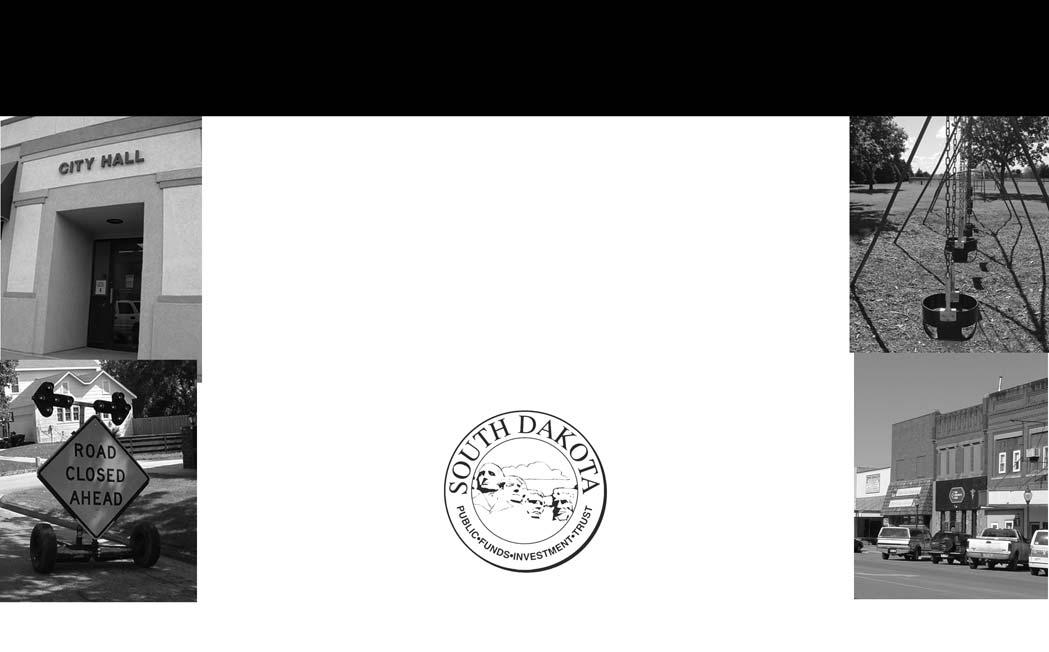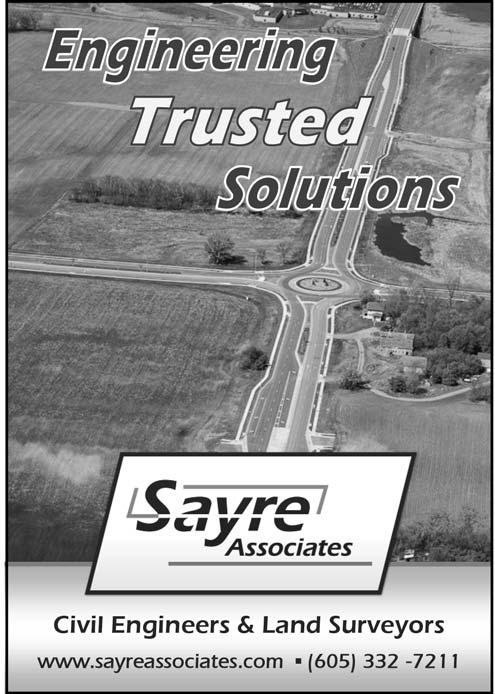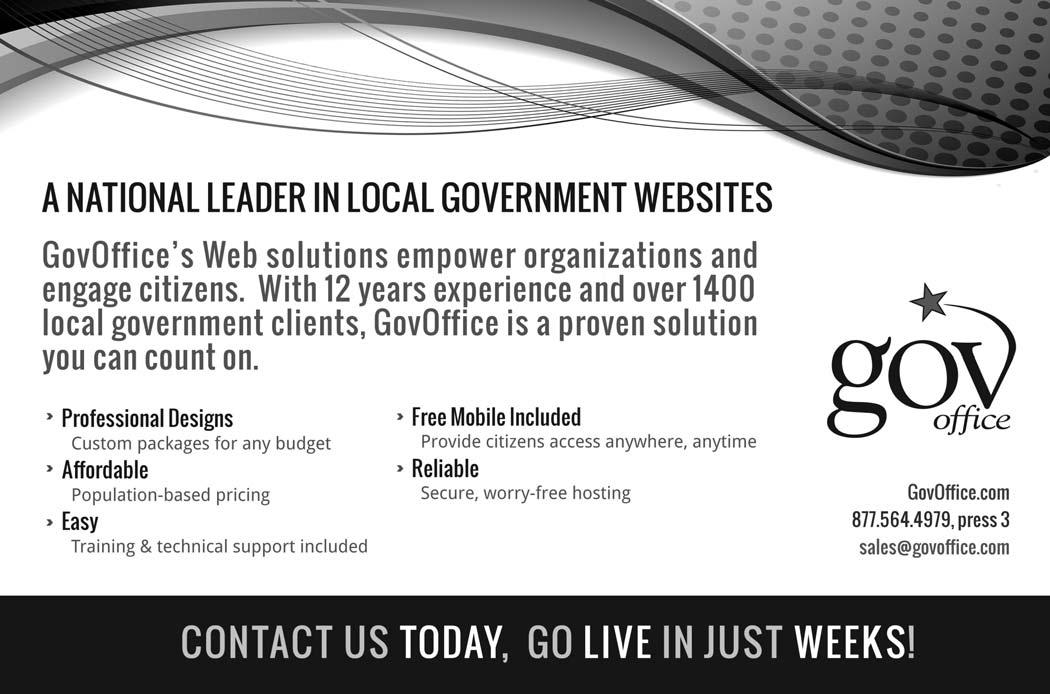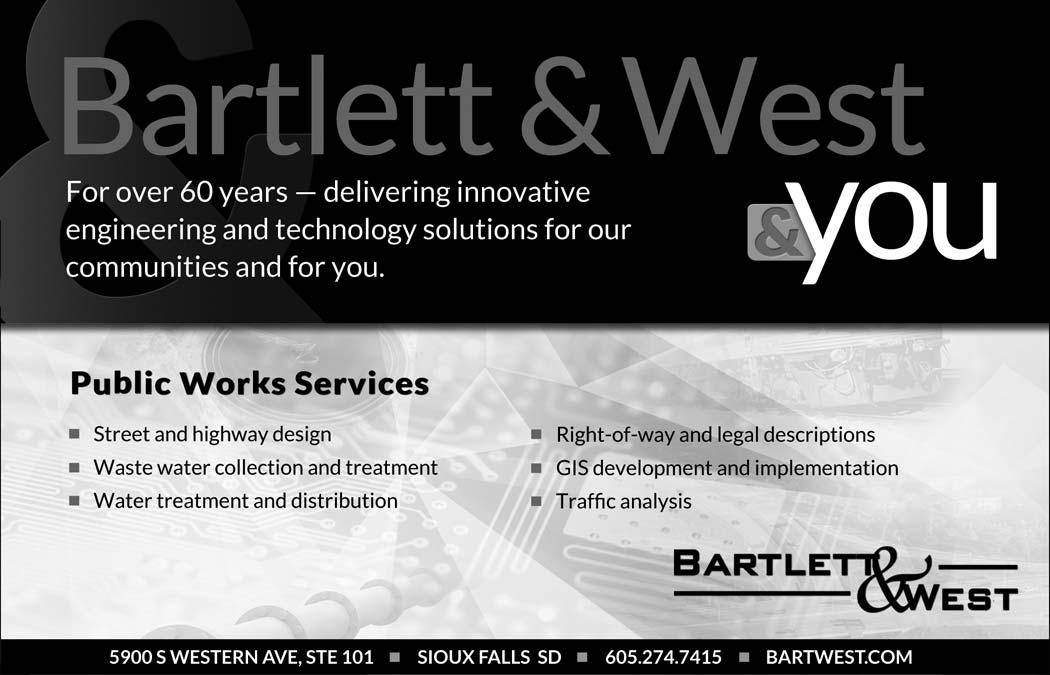
17 minute read
Growing Public Servants
What does every local elected official need to know about leadership? Experienced ones say that the secret to being truly effective is focusing more on engaging effectively with others instead of only trying to push your own agenda.
By Brian Whepley
Advertisement
Nobody hands you a how-to manual on how to lead when you’re elected to a local government office. You can’t buy a Rosetta Stone program to learn how to speak the dense language of government or how to communicate effectively with your constituents.
But you can likely benefit from the sage advice of veteran officeholders – learned through hard-earned, head-shaking experience – about what to expect and how elected officials should handle themselves.
As an elected official, you’re uniquely positioned to shape your community for the better, whether you’re serving on a school board, city council, county commission or community college board. But you’re also set up perfectly to speak before thinking and get in over your head, all while fully exposed in the public eye. The decisions you’re making affect not only you but friends, strangers, neighbors, co-workers, people who voted for you and people who didn’t.
Some of the advice from those veterans involves sticking with the things we all should have learned in kindergarten: work hard, listen closely, don’t yell, be careful what you say about others, say you’re sorry when you make a mistake, and don’t sigh and roll your eyes.
But the truth about leadership, they say, is that success is often based more on how you do things than what you do.
For instance, when Patrick Woods was first elected to the Topeka school board in 2007, he threw himself into advocating on issues that had been part of his campaign: early childhood education, a dual-language school, improving enrichment programs for all students.
He drew on knowledge gained through personal interest and as education policy adviser in Gov. Kathleen Sebelius’
administration. He used facts and figures to trumpet his case for the long-term benefits of preparing children for school before they reached kindergarten. He put out his own news releases and went on TV. And he didn’t really get anywhere.
Entrenched interests believed already scarce resources would be further diluted. Child-care providers thought the district would take away customers. Some parents feared changes in their local schools.
Woods backed up and advocated approaches he was learning while pursuing his master’s in public administration, where he focused on leadership. Engagement and ownership were essential tools, with the district using its citizens advisory council as a starting point. Parents, businesspeople and many others were brought into discussions that included early childhood education, enrichment programs, career training, shifting some schools to a K-8 model, and redrawing school boundaries and closing small, inefficient elementary schools. The conversations involved public forums, community meetings, television and other tools.
“The lesson that I learned – after beating my head against the wall initially with early childhood education – was that when I’m pushing really hard for what the science says and am expecting people to trust me (even if making sense), they’re still not always going to trust me,” Woods says. “It wasn’t until we started putting information in front of them and allowing them to arrive at their own conclusions that we made progress.”
In 2014, with the district and stakeholders having worked through discussions about closing smaller schools, voters approved a $143 million bond issue that expanded early childhood education, built a new elementary school and added a career training center, among other projects.
“They only did that because they trusted us with all this other stuff. Ten years ago that couldn’t have happened,” says Woods, who won re-election to the board in April.
On-The-Job Training and Teamwork
Being an elected official is even harder work than you can imagine it is, veterans say. You’ll learn about budgets, ordinances, state and federal policies, and a whole lot more, with much of it spoken in a language seemingly imported from Planet Jargon and written in a shorthand bureaucratese that can be deciphered only through time and questions. Lots of them.
Furthermore, if you sought office because you wanted to clean up city hall, fight off Wal-Mart or think that shifting school boundaries might harm your child, take a deep breath and open your eyes – and your mind. The job is broader than


that one issue, and residents – your neighbors – and other board members are going to expect you to care about more than that one thing. If you aren’t willing to work across factions and adapt your approach, you’re probably going to get shut out, feel frustrated and somewhat lonely, and, even worse, be an ineffective leader on that issue and others.
“If you run for political office, you have signed on with that team,” says Erik Sartorius, executive director of the League of Kansas Municipalities. “And the credibility of the entire organization is at risk if you can’t disagree in an agreeable manner.”
You might not agree with a stance, or even comprehend how a person could have reached it, but the great majority of officeholders – and paid staff – have the best interests of their city, county or school district at heart, veteran officeholders say.
“Everybody likes to take a side and think the other side is evil. For the most part, I really think both groups of people want to do the right thing, but they have their own perceptions of what that is,” says Joy Eakins, who started her first term on the Wichita school board in 2013 and has tried to build bridges with legislators on school finance and other issues. “When you start walking with those people and you get to know them, you know a lot of them really are good people.”
Get to Know Those around You
Racquel Thiesen was first elected to the Newton City Commission in 2007 and served for eight years before losing a re-election bid this past spring. She remembers well a situation when she lashed back at a fellow candidate during an “ugly campaign” several years ago, regretted it and resolved to change her approach.
“I fired off a letter saying that I wasn’t going to do business with him any longer. Then he got elected,” says Thiesen, recalling that she had thought the candidate knew about claims some supporters made.
Now, “I wouldn’t call us friends by any stretch, but I sit next to him on the bench, and I have worked really hard to build a rapport with him because I acted too hastily. ... Judging people too early was one of the mistakes I made. I didn’t like my behavior, but I wanted to be better for my sake and the community.”
Thiesen and other veterans say that the value of knowing people and where they come from – that doesn’t mean you have to have dinner with them – cannot be minimized. It’s not as easy as one might think, as the majority of time spent together is while conducting business. Open-


meetings rules, too, can have a downside, in that unofficial gatherings can readily turn into a law violation if officials start talking shop.
“One thing we don’t do very well, especially in local government, is develop personal relationships with others on the board,” says Greg Musil, a member of the Johnson County Community College board of trustees who also serves on the Kansas Leadership Center’s board. “I have developed a pretty good relationship with a person I had been at odds with. Our daughters played softball together. It’s just amazing to me when you have something in common like that. You don’t call each other names.”
Being disagreeable and closed to alternative points of view can have consequences, says Musil, who also served on the Overland Park City Council from 1993 to 2001. “If you come in with an agenda that you are going to do X, then you don’t do A, B, C or Y and you tend to not listen to other members of your body, you tend to isolate yourself. There may be five different ways to get to X, but you don’t pay heed to the other four ways to get there.”
Don’t Be Dismissive
Just as a new elected official should take care not to hastily judge fellow board members, neither should you form snap judgments regarding professional staff – the city manager, the college administrator, the streets superintendent, rec director and others who handle day-to-day operations. Sure, those professionals may have a different perspective from elected officials – you have to worry about voters; they don’t – but they often care just as deeply about the community and have years of expertise. Sometimes, though, staff gets lumped into the “them” in any “us vs. them” issue.
“The biggest mistake I’ve seen over the years is coming into office and not listening to advice from professional staff, the individuals working for the city, for the taxpayers every day,” says Dave Drovetta, who served for nearly two decades as a council member and mayor in Gardner until losing a close race in 2013. “They either have a wealth of experience or have access to a wealth of materials that we don’t as elected officials.”
Trust, respect and civility are words veteran officeholders mention frequently when discussing effective boards. Musil, looking back to his city council days, chuckles when recounting a tale of how not to treat a fellow board member. Musil had immersed himself in a budget issue and – good literature or not – decided to put his argument into rhyme. Another board member’s reaction was to

borrow from Shakespeare: “It is a tale. Told by an idiot, full of sound and fury. Signifying nothing.”
“It was the most dismissive thing that has ever been said to me in a public meeting,” Musil says. “That didn’t help our relationship.
“One of my partners said, ‘Man, you got dissed.’”
Getting past slights and differences isn’t easy. Adrienne Foster, executive director of the Kansas Hispanic and Latino American Affairs Commission, served four years on the Roeland Park City Council and from 2009 to 2013 as the city’s mayor. Her community and neighboring Mission “did not get along.” But relations improved, she says, after an initial face-to-face encounter – and a hilarious roleplaying song – with Mission’s then-city administrator at a Kansas Leadership Center training session several years ago.
Setting aside the history, “the next morning we started talking and developing a better relationship,” Foster says. “I never gave up my values or beliefs, but I was able to say we can talk to each other.”
Two people talking led to substantive progress on issues both small (paving a shared section of Johnson Drive, a major thoroughfare) and large (coordinating efforts on Johnson County’s comprehensive plan).
“The epiphany was with Mission,” Foster says. “I knew I needed to be a better leader and person. Before then I did not realize I had a problem with myself.”
Study Up and Ask Questions
Eakins, the Wichita school board member, hopes to visit every district school before her term expires in 2017. That’s nearly 100 schools – she recently reached three dozen – but she also wants to visit every school in her own district each semester to better know the issues, concerns and people. That’s a bit more work than twice-monthly Monday agenda reviews and meetings, which bring plenty of homework themselves with a sizable packet of information to read and digest.
“I think the workload surprised my family,” Eakins says. “I think they thought it would be a couple nights a month. But it was their idea” for her to seek office.
Newton’s Thiesen says the learning curve of being involved in city government was greater than she anticipated. Not only does it take awhile to learn the ins and outs of aspects such as budgeting, but the pace at which change occurs can also be challenging.

“For really good and not-so-great reasons, government moves kind of slow, and that’s part of the learning curve,” she says. “You can’t fix things overnight. There’s a process involved, and that’s hard to see until you get into it. You have to build your muscle for tolerance and patience while you work hard to make progress.”
Don Shimkus, an Oxford school board member and president of the Kansas Association of School Boards, agrees. “There’s a lot of institutional history and memory that you can’t get until you’ve been there awhile. ... Regardless of how long you have followed politics or local issues, there are always things you are not aware of, whether they happened behind the scenes recently or eight years ago.”
Like Eakins, Sartorius, Thiesen, Drovetta, Musil and Foster, Shimkus has also learned the Kansas Leadership Center’s curriculum through one of its training programs. New board members can also learn the ropes of their roles through classes offered by state associations, which can provide a primer on budgeting and other issues.
Training and other resources – such as seeking out a mentor, as Thiesen has – are valuable, but nothing replaces listening, learning and raising your hand. “Rather than sitting back, I usually counsel the opposite,” Shimkus says of newcomers. “Speak up and ask any questions you may have, because, of course, that’s the way you learn.”
In the Public Eye, Making Hard Decisions
As anyone with a computer knows, anything you say or do can spread like lightning via email or social media. Being careful what you “like” on Facebook is just one of many ways public officials must manage themselves in the spotlight. You can’t make jokes the way you used to before you took office, and as Thiesen found out, you’ll quickly undermine your position by rolling your eyes and sighing heavily.
“You really realize there are people in that room taking down every word you say, and it may show up tomorrow in the newspaper or on TV,” Eakins says.
Foster says that, even with training, she must actively remind herself of the need to “manage self,” especially when the public is watching. The effort has paid off, though, as others noticed a change, including a one-time political adversary whose neighbor went before the Roeland Park City Council with a complaint about trash. “She came up to me a few months later and said, ‘I heard a lot of good things about you. What are you doing different?’”

“Even if you are in a town of 300, you are a different creature now,” Sartorius says of holding office. “Your words now carry more weight on everything.”
Reflecting the spotlight shining on officials and how technology has changed the scrutiny, Sartorius’ organization is “looking to do some training on ‘before you hit send’” and “understanding the consequences of being in the public eye.”
One of those consequences can be explaining your views and votes to your neighbors.
“My first hard vote was on a residential day-care program, and 25 people in my ward were against it,” Musil recalls. “I ended up making a motion for it, because I thought it was the right thing. It’s hard for you to vote for what’s right when you know those people. Someone may pull up while you’re washing your car and say, ‘Aren’t you on the city council?’ You are on the front lines.” Part of the equation can involve weighing your personal opinions and values against the best interests of the community as a whole.
“I have a framework for my decision-making, but it includes my values and beliefs. But that may get in the way of making the right decision,” Thiesen says. “Just because I can pay more taxes doesn’t mean the folks I represent can.”
Listen for the Voices
Eakins thinks officials must remind themselves that, by the very fact they hold office, they may not have difficulty obtaining information or resolving a problem. That’s why, she says, it’s necessary to find ways to hear constituents’ concerns. “I have to know parents in schools and people who work in those schools so I can get an accurate picture of other people’s experiences,” she says. With a district parent’s help, for example, she had members of parentteacher groups and school site councils to her home.
“The unusual voices are the people who aren’t in authority in the district, because they have a high stake – the highest stake for a parent is what they do with their child’s education and their life,” Eakins says.
A healthy public discussion is a broad one, Drovetta says. “Contrarians are the ones who are going to push us to make better decisions. The person that wants the shopping center is not going to rush right out and point out the flaws. The person who doesn’t want it will point out the flaws, and we have to consider those to make the best decisions. A person has to be open to all sides and listen to those unusual voices.”
Drovetta acknowledges that a big mistake in his tenure was not asking a member of a vocal opposition group to

join a review committee assessing a controversial railroad intermodal facility in Gardner. “We had people who were opposed, but they weren’t ones out front with the T-shirts and signs. If we had brought someone in from that organized effort, it would have been more challenging and taken longer, but I think those folks would have at least recognized that they had a voice.”
No matter how an issue is resolved, or how well it is handled, officeholders must realize and accept that someone likely will take them to task for it. “It can be frustrating as hell, but I absolutely love the work,” Thiesen said. “You can see results and see that it matters.”
Michael Ashcraft, another alumnus of KLC, spent many years working in local government before seeking public office as a Johnson County commissioner. Sure, he says, it involves work and sacrifice, but it’s worth it.
“The last four-plus years have been a blast,” Ashcraft says. “It’s the most rewarding and challenging experience of my life.”
Reprinted with permission from the Summer 2015 issue of The Journal, a quarterly magazine published by the Kansas Leadership Center in Wichita.

Being a Good Constituent
Elected officials aren’t the only ones who can benefit from engaging with others more effectively. While it’s impossible to avoid conflict and disagreement on some issues, the following approaches will put you on solid ground as a constituent trying to influence the thinking of your elected officials.
1. Stay Calm and Respectful:
“We were at a meeting and people wanted . . . something. They came up and were very concise and presented their point in a very calm way. And I said, ‘That, ladies and gentlemen, is how you complain.’” - Dave Drovetta, former Gardner mayor
2. Realize You May Not Have All the Facts:
Joy Eakins, a Wichita school board member tells of a parent approaching her last year during a teacher’s forced transfer: “She says, ‘Look, I love this teacher. But I also know I don’t know everything. My goal is to help all of us walk through this so the administration hears our concerns.’…She just wanted to help.”
3. Don’t Rush to Judge:
“Nothing feels worse as an elected official than when people automatically assume you don’t want to help them, that you’ve sought this office for the wrong reasons.” - Patrick Woods, Topeka school board
4. Don’t Wait to Engage:
“A good constituent is someone who is interested in what’s going on when nothing is going on.” - Dave Drovetta
“There’s nothing worse than the constituent who didn’t get what they wanted and doesn’t tell anybody until it’s time to come to the public comments part of a board meeting and then wants to shout and yell about it. It could be that if they had told us, we could have done something about it.” - Patrick Woods











